George M. Cohan In America's Theater | home
Stageography | What's New | George Washington, Jr. | The Merry Malones | Broadway Jones | 45 Minutes From Broadway | About Me | The Little Millionaire | Little Nellie Kelly | The Tavern | Seven Keys To Baldpate | Ah, Wilderness! | Get Rich Quick Wallingford | The Royal Vagabond | Discography & Filmography | Early years: 1878-1900 | Broadway Rise: 1900-1909 | Broadway Emperor: 1910-1919 | Decline & Fall: 1920-1929 | Little Johnny Jones | I'd Rather Be Right | Broadway Legend: 1930-1978 | Mailbag/Contact Me | Related Links | Articles & Thoughts | The Yankee Prince
Opened February 6, 1906
The Herald Square Theater, NYC
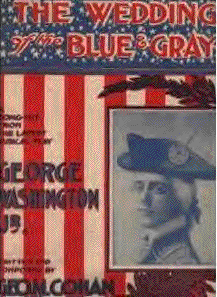
Sheet Music Cover
Original Cast:
James Belgrave.................................Jerry J. Cohan
William Hopkins..................................John Boone
Lord Rothburt.......................................G. Harrison Hunter
George Belgrave.................................George M. Cohan
Evelyn Rothburt....................................Leona Anderson
Eaton Ham...........................................Willis Sweatman
Mrs. Stebbins.......................................Helen F. Cohan
Dolly Johnson.......................................Ethel Levey

Synopsis:
Senator James Belgrave (Jerry J. Cohan) seeks to gain the fortune of Lord Rothburt
by forcing his son, George (George M. Cohan) to marry his daughter, Evelyn.
Meanwhile, George has set his eyes on Dolly (Ethel Levey), neice of Senator Hopkins
(James Belgrave's arch rival), and is apalled at his father's actions. He states that
from now on, the only father he has is the father of his country (hence, the show's title).
Senator Hopkins plants a Lord Rothburt imposter in a plot to catch Senator
Belgrave committing criminal acitivities. In the end, George weds Dolly, and James
marries Mrs. Stebbins (Helen Cohan), who is Dolly's aunt.
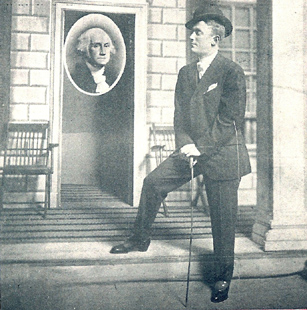
Songs From The Show:
Act I
He Was A Wonderful Man
I Was Born In Virginia
You're A Grand Old Flag*
I'll Be There With Bells On
Act II
I've Never Been Over There
All Aboard For Broadway
You Can Have Broadway*
The Wedding Of The Blue & Gray*
If Washington Should Come To Life*
* indicates songs performed by George M. Cohan
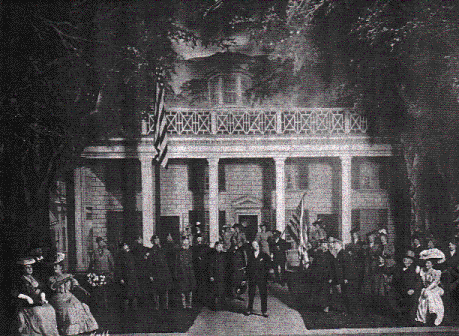
George M. performing the show stopper, "You're A Grand Old Flag."
Critic's Corner:
...the true secret of Mr. Cohan's unprecedented success, too permanent for mere
theatrical luck, consists of his admirable stagecraft. In the art of presenting
musical comedy Mr. Cohan is apparently without a peer...Cohan seems to have
fully established his theory of the melodramatic musical comedy."
The Dramatic Mirror
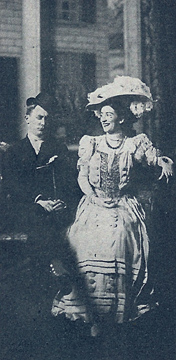
With Ethel Levy - just prior
her singing "I Was Born In Virginia"
___________________________
"An Especially Awful Example"
It certainly takes all kinds of people to make the world, and in no way can an
intelligent person be better convinced of the fact than by a consideration of
the pecuniary success attained by Mr. George M. Cohan with his curious
theatrical entertainment's, the latest of which, "George Washington, Jr.," has
recently been produced at the Herald Square Theater.
Mr. Cohan's personality and accomplishments are quite worth notice as a
peculiar evolution of our theatrical situation. He is apparently quite a young
man. Quite a large part of his stock and trade is an absolute lack of
bashfulness as to himself, his family and his doings. One curious feature of
his career is that his real name is said on good authority to be Costigan.
It is not unusual for a Hebrew to exchange a patronymic which betrays his
race for one which will conceal it, but for anyone bearing a good old mouth-
filling Irish name as Costigan for a distinctively Hebrew appellation is strange
indeed. However, Mr. Cohan is very shrewd in a business way and,
considering present conditions in the theater in America, he was perhaps
wise in his choice. He has amplified this appeal to one interest by adopting
as a bait for another the soubriquet of "The Yankee Doodle Comedian." To
some persons of discernment this might appear a trifling and, in a way,
belittling epithet, but Mr. Cohan evidently finds it a valuable asset in
attracting the attention of persons of some kind or another, as he never
permits it to be lost sight of.
Mr. Cohan is a sort of universal genius. He writes plays, he writes the words
that are set to his combinations of music to his words. These combinations
of music are curious things, consisting mainly of several bars of well-known
patriotic or sentimental songs strung together with connecting links of lively
and more or less original musical trash. The words fitted to these curious
contraptions are to the kind of unmetrical stuff that children compose and call
poetry, and are for the most part mawkish appeals to the cheapest kind of
patriotism. "George Washington, Jr." is a fair example of his playwriting. It
hinges on the Anglo-maniac tendencies of an American father, which are
strongly disapproved of by his intensely American son, who goes so far in
his intense patriotism as to renounce the paternal name and assume that of
the father of his country. On this is based a crude and silly plot, giving
opportunity for the Cohan musical sundries as well as for the chorus and
show girls now indispensable to the success of anything on the American
stage.
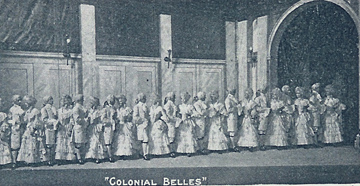
Mr. Cohan is naturally the highly patriotic youth who is the hero of the piece,
and trades on the national regard for the name of George Washington as a
dollar-catcher. His most successful effort in the song line is a similar use of
the American flag, which he dignifies in the oft-repeated refrain as "the grand
old rag." In this chapter which he has created for himself, he presumably
typifies his ideal of American young manhood. He makes him vulgar, cheap,
blatant, ill-mannered, flashily dressed, insolent, smart Aleck, who for some
reason unexplainable on any basis of common sense, good taste, or even
ordinary decency, appeals to the imagination and apparent approval of large
American audiences. As a living character in any American town or village,
it is hardly to be conceived that he would not be driven out as a public
nuisance and a pernicious example to the youth of the community. The
rounds of applause which greet the efforts of this offensive personality must
convey to the minds of ignorant boys a depraving ideal for their inspiration
and imitation.
It may seem strange that so much space should be devoted to a theatrical
attraction which, from any artistic importance, should be passed over in
contemptuous silence. But it deserves notice. It is one of the most recent
and emphatic proofs of the continuous downward tendency of the American
stage and the American audience. Mr. Cohan is not to be blamed. In fact,
from the American viewpoint that moneymaking is the test of real success,
he is highly to be commended as a successful American. If he can bring
himself to coin the American flag and national heroes into box-office receipts,
it is not his blame, but our shame. If he hasn't any higher education or ideas
than his cheap vulgarities, he is not to be blamed so much for exhibiting them
as are the people who go to see them.
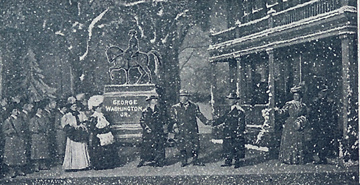
Jerry Cohan shakes hands with John Boone as Ethel,
Helen, and George look on during the final scene.
"Life" recommends its readers to go to see Mr. Cohan's performance. There
could be no stronger appeal for the betterment of the American stage - no
fiercer commentary on the debased condition of the intelligence of a large
part of the theatere-going public."
James Metcalfe, Life Magazine, 1906
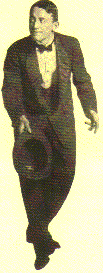
Publicity Still
from
"George Washington Jr."
Cohan's Recollection:
"Some penny a liner, who writes syndicate article, has taken it upon himself to
call me an egotist. I'd love to wager that the young man doesn't know the real
meaning of the word. I trust no one will imagine that I am - as the saying goes-
"trying to square myself." Far be it from me, for the opinion of any one man
will never make or break any ordinary person, let alone me. If an egotist is a
man who believes in himself, is not afraid of himself, and knows his true value,
then I am an egotist. If an egotist is a man who over-estimates his ability, takes
himself seriously, and figures any and everybody out of the running, I am not an
egotist. My idea of an egotist is one full of self-commendation, vanity and
conceit. This pen slinger's idea of an egotist is a successful man who fails to
advertise himself as a lucky man and whispers the lie that his achievements
are purely accidental and due to circumstances and opportunity.
In this little sheet, for the past thirteen months, I have scribbled squibs and bits,
poking fun at different people, papers and towns, and have tried to say little
things that would please the very persons at whom I poked the fun. Any sane
man would never have taken me seriously. All of my friends and acquaintances
know me well enough to know that I have never taken myself seriously.
But, for the benefit of some damn fools I've met, let me say that my success
comes from the fact that I know and have studied the business in which I
manage to knock out a very good livelihood. I write my own songs because
I write better songs than anyone else I know of. I publish these songs because
they bring greater royalties than any other class of music sold in this country.
I write my own plays because I have not yet seen or read plays from the pens
of other authors that seem as good as the plays I write. I produce my own
plays because I think I'm as good a theatrical manager as any other man in
this line. I dance because I know I'm the best dancer in the country. I sing
because I can sing my own songs better than any other man on the stage. I
never hang out with actors because I think they know so little of the business
they're in. My companions are men of great standing in this profession. I'm
always with them, because there's money in them. They're with me because
there's money in me. I publish this paper because it reaches certain desks
where certain men sit who have scissors to clip and are in a position to get
my name in other papers. I write these little stories because I think I write
them better than other writers of stories. I play leading parts in most of my
plays because I think I'm the best actor available. I pay myself the biggest
salary ever paid a song and dance comedian because I know I deserve it.
But believe me, kind reader, when I say, I am not an egotist."
The Spot Light - July 4, 1906 Vol. II, No. 3
The article above was in response to drama critic James Metcalfe's review
for Life Magazine.
______________________________
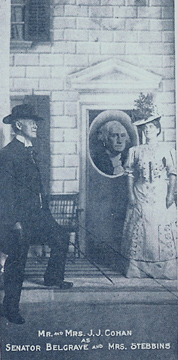
"During the season of 1905-1906, while I was still appearing in the "Jones" piece,
I set to work on still another musical comedy, with a star part for myself. The
result was "George Washington Jr.," in which I opened at the Herald Square
Theater early in February, 1906. 'Just another Cohan flag-waving affair,' was the
way the critics summed it up, but the public (God bless 'em) kept lining up at
the box office with cash in hand for the balance of the season, while the entire
population of New York City whistled "I Was Born In Virginia" and "The Grand
Old Flag" with so much delight and enthusiasm that several music publishers
accused me of having placed the whole town under salary."
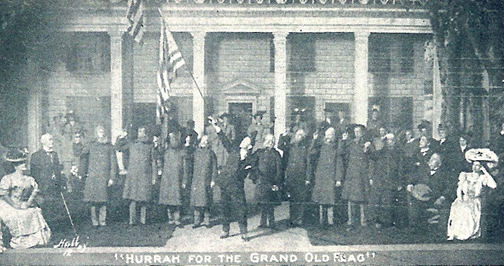
Notes:
The original title of the show's hit song, "You're a Grand Old Flag" was "You're A
Grand Old Rag." After numerous protests and accusations about it being
disrespectful to "Old Glory," Cohan changed the title to the former. It has gone on
to become one of America's greatest patriotic songs, and is still popular today, almost
100 years later. Its origin came from a civil war veteran who
was riding next to Cohan in a parade. Folded in his lap was a tattered American
flag from the Civil War. He looked down at it with affection, as he recalled his
participation in the charge of Gettysburg. He turned to Cohan and said "...and it
was all for this. She's a grand old rag." It was the kind of story George M. Cohan
could never forget. Thankfully, Cohan did a live recording of the song, and
generations to come can still hear the original inspiration.
In 1911, Ethel Levey provided a recording of her rendition of "I Was Born In
Virginia." The recording betrays just how good a performer she was. Her voice is
strong and resonate, and it is one of the best recordings from that period.

"All Aboard For Broadway" which was featured in the second act of "George
Washington Jr.," was given a nice revamping for Joel Grey in "George M!"
some sixty-two years later.
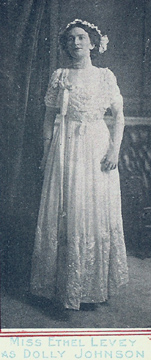
In December of 1906, Ethel Levey filed for divorce from George M., and walked out
on the show in Cleveland - never to return. She was replaced by Vinie Daly during
the second season.
